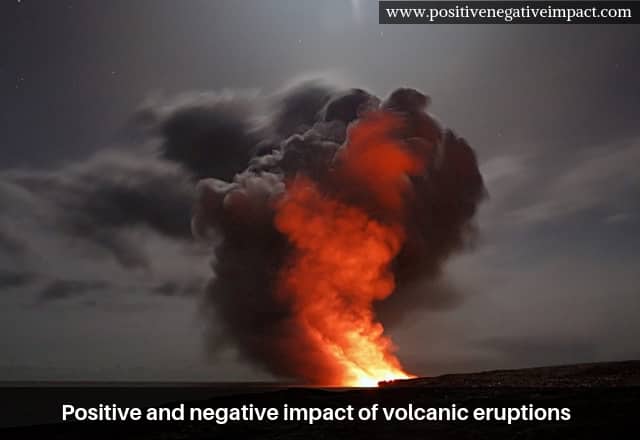Earth is active, geologically speaking and as such, it undergoes a process of constant renewal by way of volcanic eruptions. Volcanoes erupt when magma reaches the surface due to high pressure and starts to pool in a magma chamber. The resultant high pressure, the density of the magma pushes up the crust so that a cone-shaped structure takes shape; eventually, the pressure in the magma chamber builds up to high levels, eventually resulting in a volcanic eruption of ash, lava and other gases and particulates. While at the outset, it may seem that a volcanic eruption is a disruptive event, and causes widespread damage, the fact is that the same volcanic eruption can prove beneficial to the local environment. This is why we need to take a closer look at some of the positive and negative effects of volcanic eruptions.

Positive Effects of Volcanic Eruptions
- Soil fertility: volcanic eruptions help bring put various minerals and chemicals to the surface; this process helps to increase the fertility of the soil which is why volcanic soil is much valued. Apart from enhancing soil fertility, the resultant eruption also helps to bring out various precious minerals buried deep in the earth such as Diamonds, Opal, Garnets, emeralds and much more.
- Geothermal power: Volcanoes can provide you with a ready source of power since the same can be tapped by geothermal power stations and help to power up the various cities located close by; for example, Hawaii which is experiencing volcanic eruptions at the moment, has several geothermal power stations which help to generate much-needed power for all the local residences.
- Moisture: Volcanoes have been spewing moisture-laden gases directly into the atmosphere for almost 4 billion years and more. Moreover, our atmosphere is a byproduct of all the various eruptions that had taken place since the earth formed out of the primordial dust in our solar system. Volcanoes form a vital component to the water cycle on our planet by adding several tonnes of moisture-laden gases directly into our atmosphere.
- Building materials: Volcanic ash is valued as a premium building material and it has certainly been valued for its waterproofing properties since ancient times. Ancient Romans mixed lime, concrete and volcanic ash proportionally to create waterproof concrete. It is still valued in the construction industry, even today.
Negative Effects of Volcanic Eruptions
- Widespread damage: All volcanic eruptions result in widespread damage to the point that whole cities are destroyed along with the entire local infrastructure. This can impact the local population on several level sand it can take a while before the city can be reconstructed.
- Fatalities: Although there is no way to accurately predict when a volcano will erupt, scientists can still make a rough estimate depending on their observations, viscosity and density of magma etc. But the reality is that it is not always possible to accurately predict all volcanic eruptions and some even take place with little or no advance warning. For example, the recent Hawaiian volcanic eruption gave no warning indication and the end result is widespread damage and fatalities. It should also be pointed out that it is not feasible to either accurately predict or even prevent a volcano from erupting since we lack the requisite technology. Given this, most of the residents staying close to a volcano may have to consider relocating some distance away, just to be safe.
- Lava flows: When a volcano erupts, the magma spillovers as lava which then seeks the lowest point and heads towards the same. It should be pointed out that not all the lava flows behave in the same manner. Depending on the pressure in the magma chamber, the heat and the temperature, density and viscosity of the magma – which is why some of the lava moves sluggishly while others move at a rapid click. The Current lava flow in Kilauea on Hawaii is moving at a speed of 7.7 meters per second, which is faster than the speed at which an average human can move and that’s why volcanoes can often cause widespread destruction, and fatalities given the speed of the magma flow.
- Environmental damage: Even though a volcanic eruption leads to increased fertility in the soil, the process takes time. In the meanwhile, the fall out on the local environment is immediate with ash, toxic gases all of which impact the local flora and fauna.
These are some of the positive and negative impacts of volcanic eruptions.
- Tulip Mania – The Story of One of History’s Worst Financial Bubbles - May 15, 2022
- The True Story of Rapunzel - February 22, 2022
- The Blue Fugates: A Kentucky Family Born with Blue Skin - August 17, 2021
